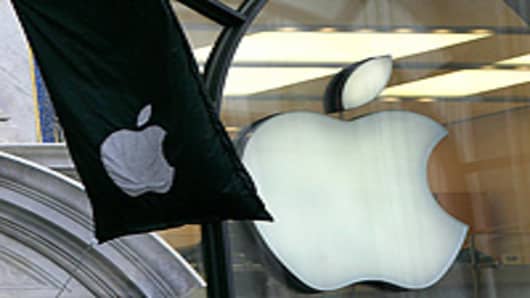Traders were positioning themselves Tuesday for Apple to disappoint on its quarterly earnings, a move that doesn't bode well for the near-term future of stocks.
With the tech giant's outsized impact on the major indexes, an earnings miss against the lofty expectations for the Silicon Valley company likely would be felt throughout the investment world and into what could be a summer of uncertainty on Wall Street.
Market pros began to brace themselves if Apple failed to meet expectations, with the stock shedding another 2 percent Tuesday in what has been a brutal two-week period.
"We appreciate Apple’s growth and ratio valuations, but with the shares up over 40 percent year-to-date, we mention that expectations remain white hot and the company may face a scenario of 'sell the news' if results do not produce the large upside that is widely expected," Colin W. Gillis, technology analyst at BGC Partners, said in a research note.
Gillis has a "hold" rating on Apple, with a price target of $500 — about a 12 percent drop from the morning's opening level.
Earnings season thus far has been met with a near-record amount of companies beating analyst expectations. But those stellar results have yet to move markets, with large indexes like the Standard & Poor's 500 trading right around the levels where they stood before the season began.
The trend gets significantly worse when looking at technology.
Tech stocks that have missed market expectations — think Google , IBM and Intel — "have gotten absolutely mauled on their report days," says Paul Hickey at Bespoke Investment Research.
Tech companies that disappointed the Street have fallen 7.6 percent the day they reported. Also, Apple historically gains more than 2 percent on its reporting day but was heading for a 2 percent loss with a half hour left in trading.
"If you own a tech stock that misses estimates, look out below," Hickey says. "It’s almost too risky to even own tech names heading into their report days due to these severe declines."
Overall, companies beating earnings have gained 1.78 percent on their reporting days, but Hickey points out that all of the gains have came in after-hours or premarket trading. During the official trading hours, the stocks have opened higher then given up their gains during the day.
"So unless you’ve owned stocks before they report, you haven’t been able to make money by buying earnings plays once they open for trading," he says.
The main problem with Apple lies partly with fundamentals but primarily on technical wariness over a stock that has had such a meteoric rise. Any type of blip in earningscould trigger a significant slide in a negative direction.
"What are you supposed to do? Buy low and sell high. You can buy high and sell higher if the momentum is with you. But if the momentum rolls over, look out below," says Kathy Boyle, president of Chapin Hill Advisors in New York. "Unless Apple comes out with really convincing numbers, if there's any dent to the shine you're going to see Apple continue to come down."
More broadly, the marketitself has been flirting with some important technical levels as it pulls back from the bull market rally off the October lows. Traders are looking at whether the S&P 500 can hold around the 1365 level as an important test of the last meaningful dip in early March.
"If (Apple) further disappoints the stock could still take a hit, and that's going to put pressure on all the indexes," says Rick Bensignor, chief market strategist at Merlin Securities in New York. "The S&P has held support above 1,360. People are hoping that Apple can save the day."




